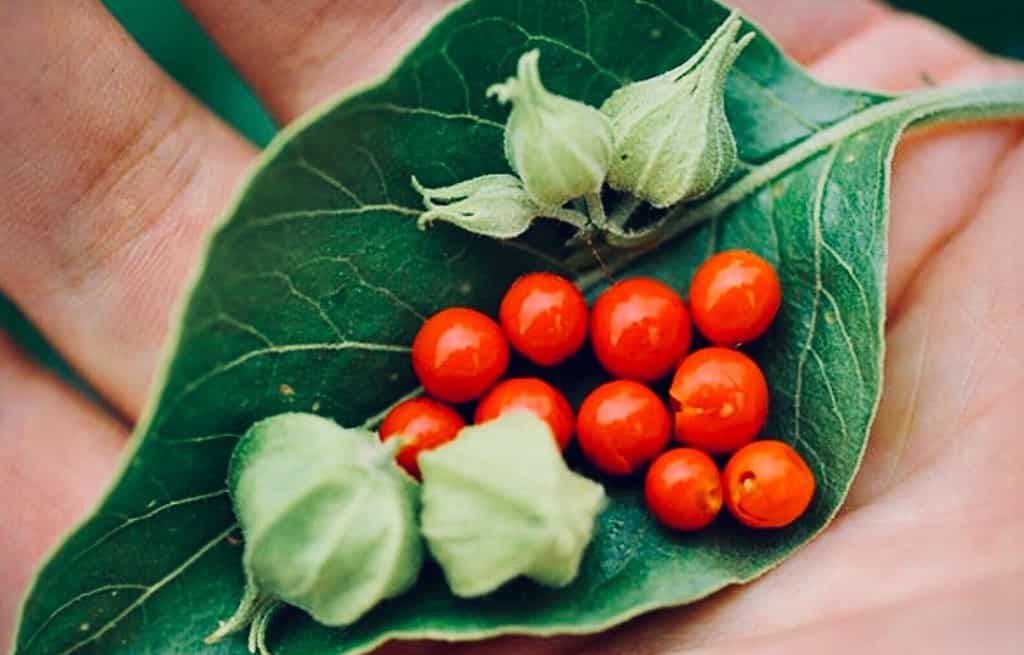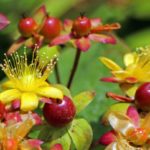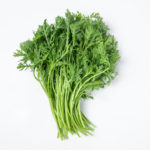
Kate McCullough
BA (Ayurveda Wellness and Integrative Health)
Ashwagandha is an ayurvedic herb that is starting to become more popular in the west. It is known for its amazing rejuvenating qualities and adaptogenic abilities, such as
- increasing resilience to stress
- reducing anxiety
- supporting a healthy immune system
- supporting healthy sleep
- supporting the reproductive system (men and women)
Rejuvenating herbs are deeply nourishing and supporting to all the tissues and bodily systems, while adaptogenic herbs help the body to adapt to psychological and physiological stress more effectively.
These two effects, rejuvenating and adapting, is what makes ashwagandha such a powerful herb, as we’ll see later in this article.
Introduction
Ashwagandha is a Sanskrit word meaning “the smell of a horse” which refers to its unique smell and ability to give us the strength and stamina of a horse.[1]
Ashwagandha is known as the king of Ayurvedic herbs
It is considered a nervine, brain and immune tonic and is commonly used for health conditions related to low energy, stress, anxiety and poor sleep.
Other names
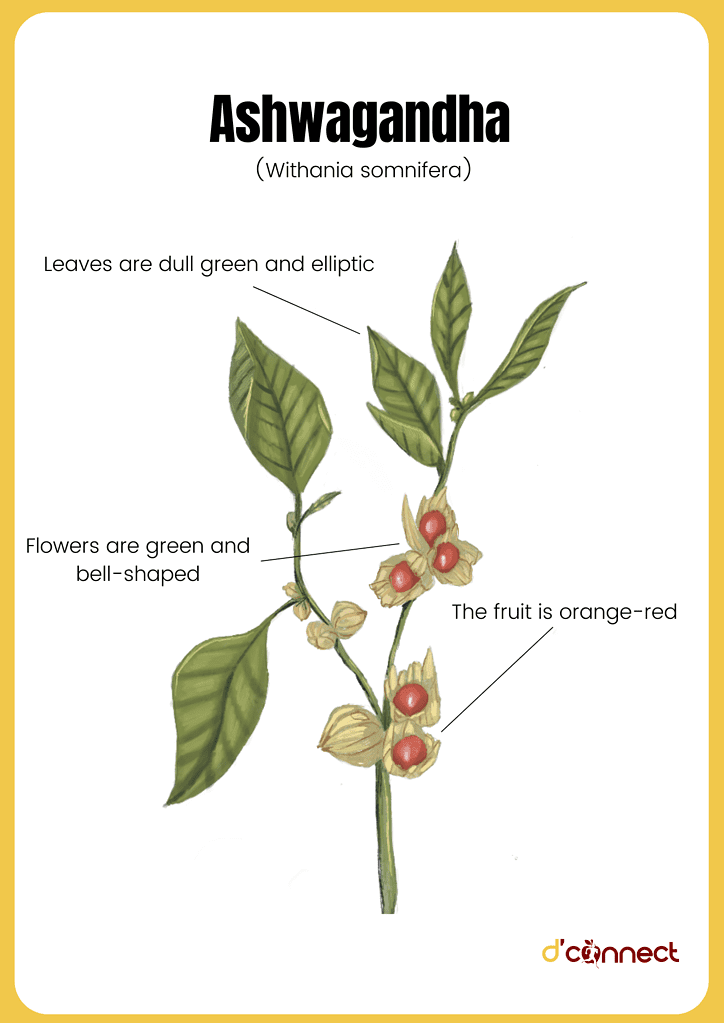
- Withania somnifera (Scientific name)
- Indian Winter Cherry
- Indian Ginseng.
Characteristics
Ashwagandha is an evergreen shrub in the Solanaceae family that is native to India, Northern Africa and the Middle East.[2]
The roots of the Withania Somnifera plant have a very distinct odour, which has been described as being similar to green tomatoes. The leaves are described as being similar to horse sweat, and can be used as insect repellent.[3]
The plant also has poisonous fruits (berries) that start out green and turn orange/red as they mature.[3]
The root is the medicinal part of the Withania Somnifera plant and is usually dried and ground into a powder, known as Ashwagandha powder.[3]
Use
Ashwagandha has been used in Ayurvedic medicine for thousands of years for a wide variety of uses including
- anxiety
- insomnia
- fatigue
- memory loss
- infertility
- arthritis
- stress
- balancing blood sugar levels
- longevity
Traditional use
Ashwagandha is rooted in Ayurvedic Medicine which dates back to 6000 BC. It was traditionally used as a rasayana, which is an Ayurvedic medical term referring to techniques that lengthen lifespans and expand happiness.[4]

RELATED — Introduction to Ayurveda: Ancient medicinal healing methods
It was also regarded as a
- tonic
- aphrodisiac
- narcotic
- anthelmintic
- diuretic
- thermogenic
- stimulant
It was commonly used for malnourished children (given with milk), sarcopenia, rheumatism, constipation, insomnia, goiter and nervous breakdowns.[4]
Medicinal use
The most common medicinal use for ashwagandha is for treating stress and anxiety.
For anxiety it seems to alter the signalling of several neurotransmitters, which become dysfunctional in anxiety disorders.[5]
For stress it influences the hypothalamic-pituitary-adrenal axis which plays a big role in our ability to handle stress.[5]
Some other medicinal uses are:
- lowering cholesterol levels
- enhancing GABAA receptors which improves sleep (quality and length)
- increasing testosterone which can improve sperm quality and decrease infertility in men
- increasing levels of haemoglobin which may improve endurance performance
Health benefits
Anti-anxiety prescriptions are on the rise, especially since Covid. Unfortunately, many people who take anti-anxiety medications experience a range of side effects, including an increase in anxiety.[6]
The health benefits of ashwagandha are nothing short of amazing. It is an adaptogenic herb that adapts to the needs of our body while also rejuvenating the tissues, especially the reproductive system.
In Ayurveda ashwagandha would be most commonly used for Vata conditions. As Vata is the root cause of most diseases, ashwagandha would be beneficial for most (but not all) people.
RELATED — Vata imbalance: Are you always worried, anxious and cold?
Some of its many health benefits include
- enhancing and supporting brain health
- rejuvenating properties
- anti-oxidant properties
- anti-inflammatory properties
- increasing stress resilience
- improving cell-mediated immunity
- nourishing the reproductive system[4]
Ashwagandha as a brain tonic
For patients suffering from neurodegenerative diseases such as Alzheimer’s, Parkinson’s and Huntington’s disease, it is seen in their brains that the atrophy of neurites (abnormal function or loss of function in parts of the brain) is playing a big role in the cause of these diseases.[4]
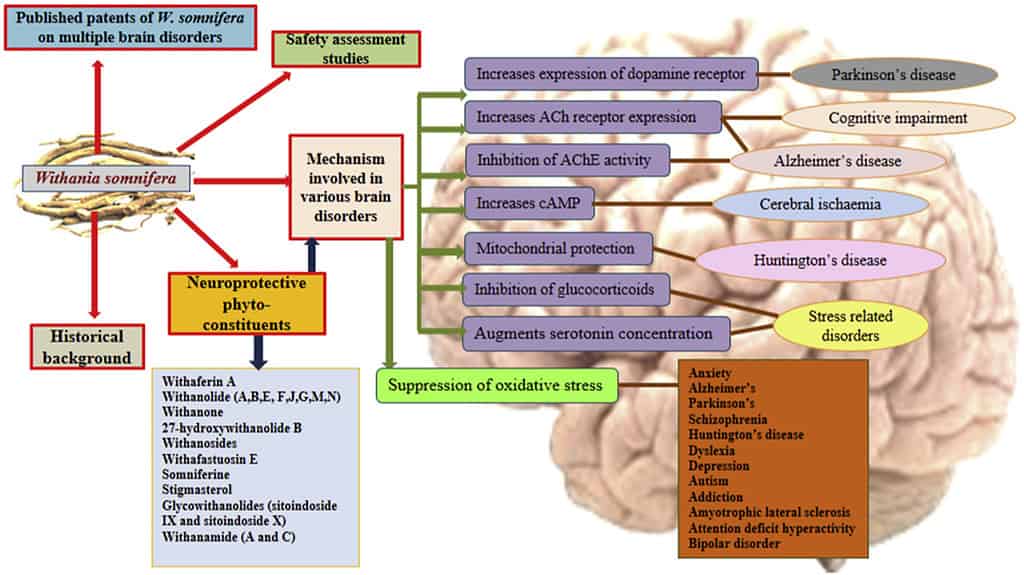
Ashwagandha as a rejuvenating herb
A clinical trial done on 101 normal healthy male volunteers aged 50-59, where they were given 3g of powdered ashwagandha a day for one year recorded significant increases in haemoglobin.[7]
There were also improvements in hair melanin (the pigment that determines hair colour) and seated posture.[7]
In the same study, 71.4% also reported improvement in sexual performance.[7]
RELATED — Have you got poor posture? (18 long-term effects and health risks)
Ashwagandha and antioxidant properties
In a study conducted on rats, active glycowithanolides (a group of pharmacologically active compounds) of ashwagandha were given once daily for 21 days.[7]
The researchers recorded an increase in major free radical scavenging enzymes which represents antioxidant activity.
This shows that ashwagandha does have an antioxidant effect on the brain and could explain its diverse pharmacological properties.[7]
Ashwagandha and anti-inflammatory benefits
A randomised, double-blinded study was done on 60 patients who were split into three groups to check the effects of ashwagandha on knee swelling (KSI) at the end of 4, 8 and 12 weeks.[8]
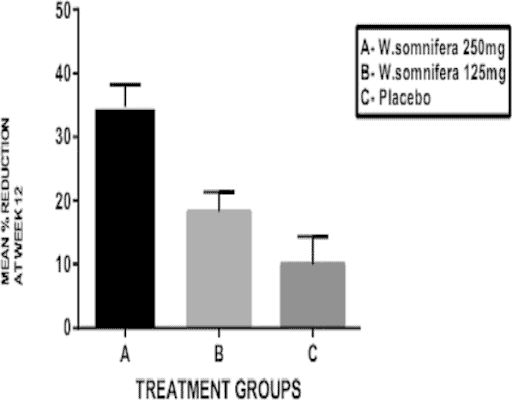
Two of the groups were given 250 mg or 125 mg of an aqueous extract that is high in withanolide glycosides (made from the leaves and roots of the plant), while the third was given a placebo. All three groups were given two doses daily.[8]
The improvements were seen in the 125 mg and 250 mg group, with significant improvement for the group that received the higher dose.[8]
Ashwagandha and stress resilience
Research shows that high-concentration of full-spectrum ashwagandha supplements (extract) are improving people’s resilience towards stress and therefore overall improving their quality of life.[9]
A study done on 64 subjects (32 in each group – a placebo and ashwagandha group) to measure the difference in perceived stress scale (PPS) was conducted over 60 days.[9]

The study showed that the placebo group had a 5.5% reduction in PPS, compared to the ashwagandha group which had a 44% reduction in PPS.[9]
Ashwagandha and effects on cell-mediated immunity
The effect of ashwagandha on the cellular immune responses was studied in normal as well as tumour-bearing animals.
The administration of ashwagandha extract was shown to enhance an increase in lymphocytes, bone marrow cells and thymocytes in response to mitogens (non-specific stimulants of immune cells, which induce a cell to begin or enhance cell division).
Natural killer cell activity was also found to have been enhanced in normal and tumour-bearing groups.[10]
Ashwagandha and reproduction
A study was done on 46 male patients aged between 22 and 44 who had a low sperm count (< 20 million/mL semen) for 90 days.[11]
The treatment with a high-concentration, full-spectrum ashwagandha root extract showed improvements in testosterone and luteinizing hormone.[11]
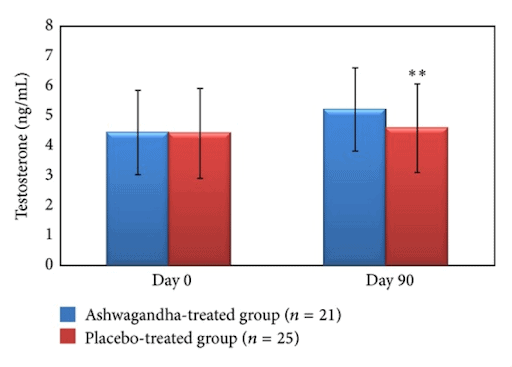
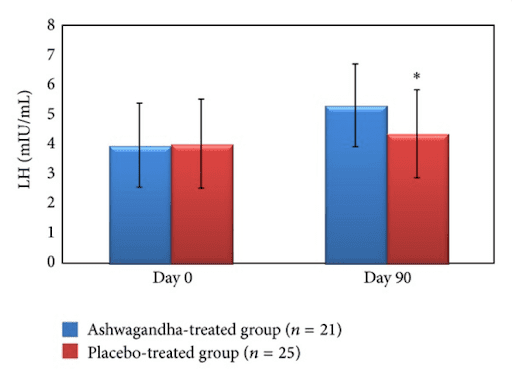
Considering that over the last 2 decades studies recorded a decline in serum testosterone among adolescent and young men, ashwagandha might be one of the more natural approaches in changing this.
Ashwagandha and sleep
Ashwagandha’s sleep-aiding effects are thought to be connected to its abilities to reduce anxiety.[8]
A randomised, double-blind, placebo-controlled study was done on 60 people who were divided into 2 groups (40 people were in the test group and 20 people in the placebo group).[8]
Both groups were given a capsule twice daily for 10 weeks, with the test group given a full-spectrum 300 mg ashwagandha root extract. We can see the result in the graphs below.[8]
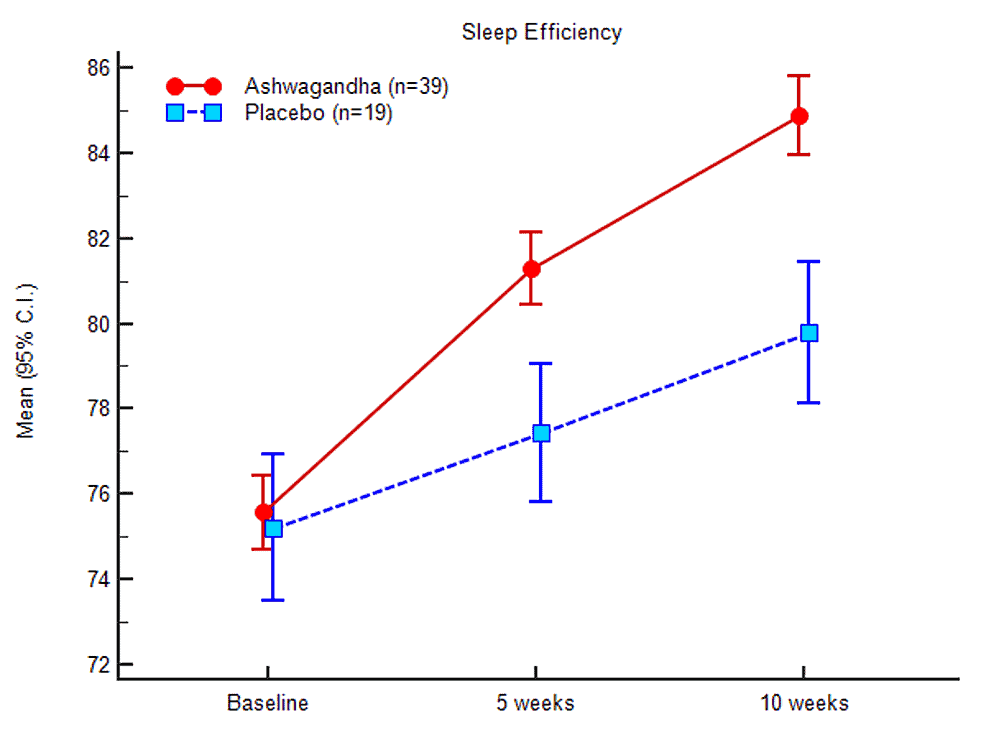
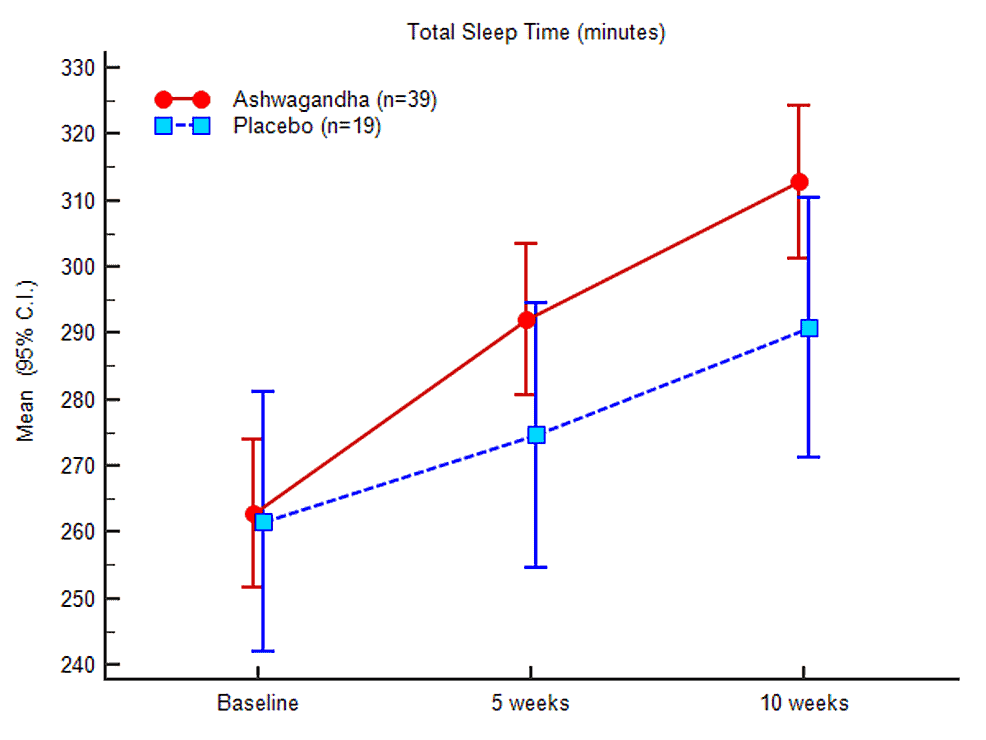
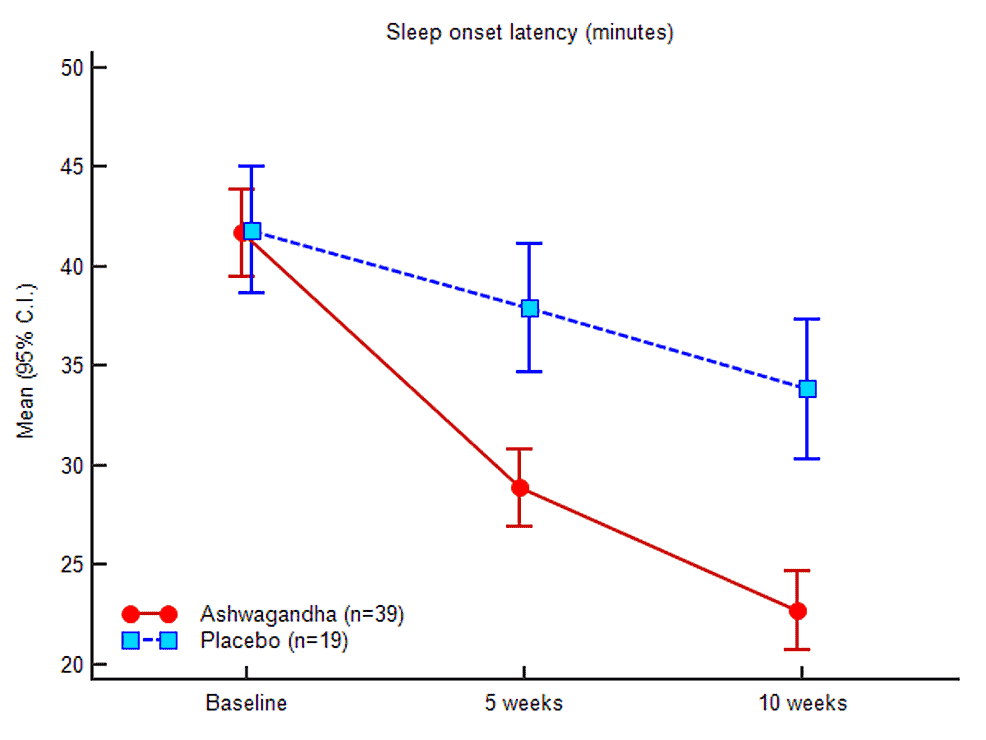
The great benefit about using ashwagandha as a sleep aid is that currently there is no evidence that it causes dependency, unlike other sleep aids on the market.
Therapeutic dosage
While ashwagandha can be taken in tablet or capsule form, it is traditionally taken in powder form.
Generally, ¼ – ½ tsp of powder is taken 2 times daily, in the morning and evening.
The powder can be mixed with warm water, boiled in organic milk or mixed with ½ tsp ghee and ½ tsp of honey (in winter months) or raw sugar (in summer months).[1]
Why ashwagandha might not be the herb for you
Ashwagandha is from the root of the Withania somnifera plant giving it dense, heavy and oily qualities which can be difficult to digest for people with low agni (digestive fire).[12]
To make it more digestible, it is recommended to take it with an Anupana (carrier) like ghee and honey or boiled milk with cinnamon.
Taking ashwagandha in capsule form may not prove very beneficial to people with weak digestion.[12]
Since ashwagandha is a rejuvenating herb it is not recommended for people that have high ama (impurities) or an imbalance in the Kapha dosha.
This is because of ashwagandha’s heavy and dense qualities, which are also qualities of kapha, so taking ashwagandha may increase kapha and lead to poor digestion.
Ashwagandha is also considered to have a heating quality to it, so should not be used as a single herb in high pitta conditions due to its ability to increase heat in the liver.[12]
When mixed in certain formulas with other cooling herbs, such as
- amalaki
- coriander
- cardamon
- neem
it is considered suitable for pittas.
RELATED — Pitta imbalance: Are you easily irritated and prone to skin rashes or heartburn?
While ashwagandha is considered a safe herb, it is best to see an Ayurvedic practitioner to make sure it is the right herb for you.
Safety concerns
A study done on ashwagandha in 2012 showed no serious adverse effects while taking the herb or when stopping the herb, which is consistent with other studies done on ashwagandha.[9]
People allergic to the Solanaceae family should avoid taking ashwagandha.[9]
Also, if taken in excess it can cause abdominal discomfort or diarrhoea.[1]
Like all herbs in Ayurveda unless personally prescribed by a practitioner they are not recommended to be taken during pregnancy.
Possible interactions with medications
Since ashwagandha enhances the immune system it could interfere with medications that suppress the immune system such as
- cyclosporine
- mycophenolate
- tacrolimus
- prednisone
- corticosteroids[13]
It could also interact with sedatives, blood thinners, thyroid supplements/hormones (e.g. carbimazole and propylthiouracil), drugs for anxiety and medications for high blood pressure and diabetes.[14]
Possible interactions with herbs and supplements
Ashwagandha is generally considered a safe herb to combine with other herbs and supplements.
However, take caution when combining it with other herbs that induce sleep since ashwagandha also has a sedative effect.
Ashwagandha has a sedative effect
Always read and research before adding any new herb into your daily routine and check with your doctor if you are currently on any medication.
Tips
Adaptogens like ashwagandha need to be taken for up to 3 months to start producing a noticeable effect and can be taken for up to 12 months.
It is best taken in the autumn and winter and stopped or reduced in the summer due to its slight heating effect in the body.
It’s best not to take ashwagandha if a quick result is needed. Also, it is best to buy a good quality source of ashwagandha from a trusted source.
While capsules are a convenient option, you are likely to get more benefits when buying the powder and combining it with an Anupana (carrier).
Summary

Note — feel free to share or download this illustration.
Related Questions
1. Can ashwagandha be taken on an empty stomach?
Yes, generally it is recommended on an empty stomach in the morning and before bed.
However, if your stomach doesn’t tolerate it well, you can add it to a cup of warm organic milk or take it with a small amount of food.
2. Can ashwagandha increase libido?
Yes, some studies have shown ashwagandha’s ability to increase libido in women and men while also improving lubrication and eliminating pain during intercourse.[15]
3. Can ashwagandha help you lose weight?
Ashwagandha is more of a nourishing herb and suited for people with a Vata imbalance who tend to be underweight.
While it is unlikely to make you gain weight, it is not an ideal herb for weight loss when taken alone.
If you liked this article and are interested in reading more about different herbs, we suggest browsing through our Natural Medicine page.
Kate is currently studying for a Bachelors in Ayurveda from the Maharishi International University. Her passion for holistic and alternative health modalities started when she was 18 and already experiencing an array of health issues that the doctors had no answers for. This led Kate down the path of studying the ancient knowledge of Ayurveda to regain her health and vitality again.
Kate’s focus is on gut and mental health, sleep, and exercise where through pulse readings, diet, daily routines, seasonal cleansings, yoga, and meditation we can create a balance.
Kate is a part of the Content Team that brings you the latest research at D’Connect.
References
(1) Banyan Botanicals. (n.d.). Ashwagandha: Benefits, Uses & Side Effects – Ayurvedic Herb Guides. Banyan Botanicals. Retrieved February 27, 2023, from https://www.banyanbotanicals.com/info/plants/ayurvedic-herbs/ashwagandha/
(2) Banyan Botanicals. (2018, April 11). Growing Ashwagandha. Banyan Botanicals. Retrieved February 27, 2023, from https://www.banyanbotanicals.com/info/blog-the-banyan-insight/details/co-creating-health-with-ashwagandha/
(3) NC State University. (n.d.). Withania somnifera (Ashwagandha, Ashwagandha, Vedic, Indian Ginseng, Indian Winter Cherry, Poison Gooseberry, Winter Cherry). North Carolina Extension Gardener Plant Toolbox. Retrieved February 27, 2023, from https://plants.ces.ncsu.edu/plants/withania-somnifera/
(4) Singh, N., Bhalla, M., Jager, P. d., & Gilca, M. (2011, July 3). An Overview on Ashwagandha: A Rasayana (Rejuvenator) of Ayurveda. NCBI. Retrieved February 27, 2023, from https://www.ncbi.nlm.nih.gov/pmc/articles/PMC3252722/
(5) Murray, M. (n.d.). Ashwagandha — Health benefits, dosage, safety, side-effects, and more. Examine. Retrieved February 27, 2023, from https://examine.com/supplements/ashwagandha/
(6) Health Direct. (n.d.). Anxiety medication. Healthdirect. Retrieved February 27, 2023, from https://www.healthdirect.gov.au/anxiety-medication
(7) Mishra, L. C., Singh, B. B., & Dagenais, S. (2000, September). Scientific basis for the therapeutic use of Withania somnifera (Ashwagandha): A Review. Retrieved February 27, 2023, from https://www.researchgate.net/publication/12365397_Scientific_basis_for_the_therapeutic_use_of_Withania_somnifera_Ashwagandha_A_Review
(8) Langade D, Kanchi S, Salve J, et al. (September 28, 2019) Efficacy and Safety of Ashwagandha (Withania somnifera) Root Extract in Insomnia and Anxiety: A Double-blind, Randomized, Placebo-controlled Study. Cureus 11(9): e5797. doi:10.7759/cureus.5797 https://www.cureus.com/articles/22928-efficacy-and-safety-of-ashwagandha-withania-somnifera-root-extract-in-insomnia-and-anxiety-a-double-blind-randomized-placebo-controlled-study#!/
(9) Chandrasekhar, K., Kapoor, J., & Anishetty, S. (2012, Jul-Sep). A Prospective, Randomized Double-Blind, Placebo-Controlled Study of Safety and Efficacy of a High-Concentration Full-Spectrum Extract of Ashwagandha Root in Reducing Stress and Anxiety in Adults. NCBI. Retrieved February 27, 2023, from https://www.ncbi.nlm.nih.gov/pmc/articles/PMC3573577/
(10) Kuttan, G., & Davis, L. (2002, Dec 21). Effect of Withania somnifera on cell mediated immune responses in mice. PubMed. Retrieved February 27, 2023, from https://pubmed.ncbi.nlm.nih.gov/12636106
(11) Ambiye, V. R., Langade, D., Dongre, S., Aptikar, P., Kulkarni, M., & Dongre, A. (2013, Nov 28). Clinical Evaluation of the Spermatogenic Activity of the Root Extract of Ashwagandha (Withania somnifera) in Oligospermic Males: A Pilot Study. NCBI. Retrieved February 27, 2023, from https://www.ncbi.nlm.nih.gov/pmc/articles/PMC3863556
(12) Spillane, R. (2020, February 3). Why Ashwagandha Isn’t for Everyone — SARASWATI AYURVEDA. Saraswati Ayurveda. Retrieved February 27, 2023, from https://www.saraswatiayurveda.com/blog/2020/2/3/why-ashwagandha-isnt-for-everyone
(13) Shane-McWhorter, L. (2022). Ashwagandha – Special Subjects – MSD Manual Consumer Version. MSD Manuals. Retrieved February 27, 2023, from https://www.msdmanuals.com/en-au/home/special-subjects/dietary-supplements-and-vitamins/ashwagandha
(14) Griffin, R. M. (2022, November 29). Ashwagandha: Herbal Information From WebMD. WebMD. Retrieved February 27, 2023, from https://www.webmd.com/diet/supplement-guide-ashwagandha
(15) Trusted Nutrients. (2020, April 11). Your Guide to Ashwagandha: Frequently Asked Questions. Trusted Nutrients. Retrieved February 27, 2023, from https://www.trustednutrients.com/blogs/health-tips/your-guide-to-ashwagandha-frequently-asked-questions
